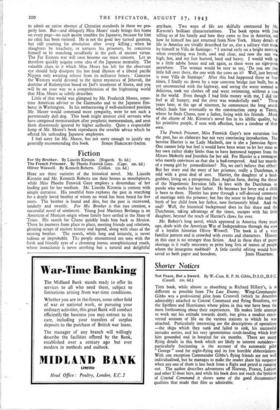Fiction
For My Brother. By Lincoln Kirstein. (Hogarth. 8s. 6d.)
The French Prisoner. By Phoebe Fenwick Gaye. (Cape. ros. 6d.) Oliver Wiswell. By Kenneth Roberts. (Collins. 12S. 6d.) HERE are three varieties of the historical novel. Mr. Lincoln Kirstein and Mr. Kenneth Roberts use their heroes as mouthpieces, while Miss Phoebe Fenwick Gaye employs -a descendant of her leading pair for her medium. Mr. Lincoln Kirstein is content with simple narrative. His youthful hero explores the past in searching for a dearly loved brother of whom no word has been heard for five years. The brother is found and dies, but the past is recovered, tenderly and sweetly. For My Brother is that rare creation, a successful novel of sentiment. Young Jose Martinez Berlanga is an American of Mexican origin whose family have settled in the State of Texas. His search for Chano quickly leads him back to Mexico. There he journeys from place to place, meeting friends and relations, gleaning scraps of ancient history and legend, along with clues of the missing brother. The search, while long and leisurely, is never tedious or improbable. The people encountered are seen with the fresh and friendly eyes of a charming joyous unsophisticated youth, whose insouciance is never anything but a natural and delightful attribute. Two ways of life are skilfully contrasted by Mr. Kirstein's brilliant characterisations. The book opens with Jose telling us of his family and how they came to live in America, and how he himself has just returned from New York. Many details of life in America are vividly described for us, also a solitary visit made by himself to Villa de Santiago : " I started early on a bright morning when everything was fresh, cool and clear, and now the sun was high, hot, and my .feet burned, hard and heavy. I would walk up to a little adobe house and ask again, as there were no sign-poste anywhere. The woman would be sure to say, ` Do you see that little hill over there, the one with the cows on it? Well, just beyond is your Villa de Santiago.' After this had happened three or four times, I finally sat down by a new concrete bridge just built, but as yet unconnected with the highway, and seeing the water seemed so delicious, took my clothes off and went swimming, without a care in the world. Even though I had little money with me, I did not feel at all hungry, and the river was wonderfully cool." Three years later, at the age of nineteen, he commences the long search which leads him eventually to the construction camp at Taman, where he finds Chano, now a father, living with his friends. Much of the charm of Mr. Kirstein's novel lies in its idyllic quality, but his primitive people, if seen with affection, have a candour of their own.
The French Prisoner, Miss Fenwick Gaye's new excursion into the past, has an elaborate but not very convincing introduction. Her heroine Harriet is no Lady Macbeth, nor is she a Jamesian figure. One cannot help but feel it would have been wiser to let her strut on her own rather shaky limbs than to have borrowed support from the Misses Moberly and Jourdain for her aid. For Harriet is a termagant who merely convinces us that she is bad-tempered. And her murder of a young girl by premeditation? No, we can't believe that either! But her story and the story of her prisoner, really a Dutchman, is told with a great deal of zest. Harriet, the daughter of a 'land- grabber, living on a prosperous East Anglian farm, during the threat of the Napoleonic Invasion falls in love with the Dutchman on parole who works for her father. He becomes her lover and a child is born to them. Harriet has gone through a self-devised ceremony _ of marriage with the prisoner, but has the sense to keep this and the birth of her child from her father, now fortunately blind. And the end? Well, the historical background does its fair share and the Dutchman, taking advantage of the times, escapes with his little daughter, i.eyond the reach of Harriet's claws for ever.
Mr. Robert's long novel, which appeared in America three years ago, deals with the American Was. of Independence through the eyes of a loyalist historian Oliver Wiswell. The book is of a very familiar pattern and is crowded with events and characters. History in this case is no stranger than fiction. And in these days of paper shortage is it really necessary to print long lists of names of people whom the insurgents mobbed? A little careful editing would have saved us both paper and boredom. JOHN HAMrsON.






















 Previous page
Previous page